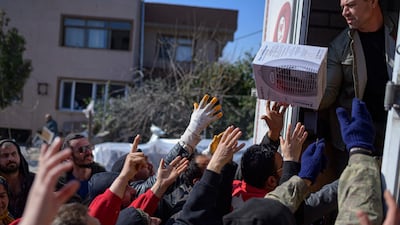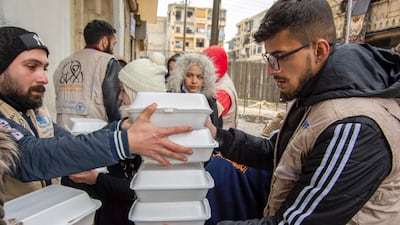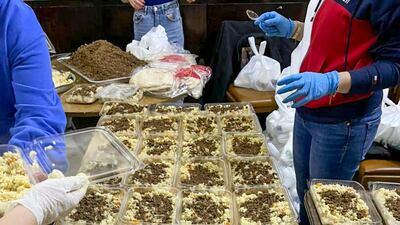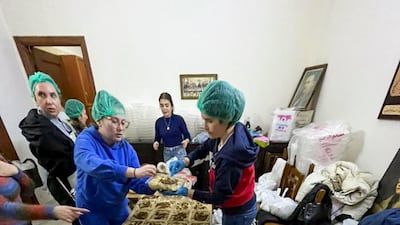Nations must "depoliticise" the humanitarian response for earthquake victims in Syria, a UN special envoy said on Tuesday, as frustrations mount over the slow pace at which aid has flowed into the country.
More than 50,000 people have been killed in Turkey and Syria, including about 6,000 people in Syria, mostly in the north-west, since the February 6 earthquake.
The UN's special envoy for Syria, Geir Pedersen, told the Security Council that Syrians in the north-west, in areas outside government control, have expressed “strong frustrations at the international community’s inability” to help them.
World Food Programme earthquake aid - in pictures
It is not the time “to play politics with crossings across borders or front lines … this is not the time for military action or violence", Mr Pedersen said by video link.
Six days after the first earthquake, UN humanitarian chief Martin Griffiths acknowledged that the UN had "failed" the people of north-west Syria.
Rebel-held areas, the hardest hit by the earthquakes, did not receive their first UN humanitarian aid until four days after the disaster, leading to criticism of the world body.
The UN has been under mounting pressure to establish more border crossings from Turkey into Syria.
Efforts to do so have been repeatedly thwarted by Russia, which has veto power at the Security Council.
Moscow, the primary backer of Syrian President Bashar Al Assad, opposes the delivery of assistance to rebel-held areas.
It says cross-border aid deliveries, which date to 2014, were meant to be temporary.
The Kremlin wants to ensure that all humanitarian assistance is channelled through the Syrian government and allow it to have control over distribution.
Mr Pedersen said that the situation was “unsustainable” and the status quo “totally unacceptable".
Acting deputy US ambassador to the UN, Robert Wood, called on the Assad regime to enable humanitarian operations and “refrain from diverting or politicising aid".
“If that requires Council action, then we must be prepared to act," Mr Wood said.
Russia's deputy UN ambassador, Dmitry Polyansky, said Moscow did not “wish to work through the UN mechanisms primarily because despite all of our requests, they remain opaque for us".
“We cannot get basic information about the projects that are being carried out in general,” he added.
But Mr Al Assad ceded to calls this month to allow the delivery of humanitarian aid through two more border crossings to Syria's north-west, where four million people were already dependent on aid.
Mr Griffiths welcomed the agreement to open Bab Al Salam and Al Ra’ee border crossings for the UN to deliver humanitarian aid to north-west Syria.
The UAE's deputy ambassador to the UN, Mohamed Abushahab, reaffirmed the need to bring the Syrian regime “back into the fold”.
Mr Abushahab called for the international humanitarian response to Syria to be “intensified by every possible means to reach all those affected".
After the earthquake, 97 UAE relief flights carrying 2,624 tonnes of humanitarian aid landed on Syrian soil.
The UAE also offered Syria a fleet of 10 new ambulances as part of Operation Gallant Knight 2.
President Sheikh Mohamed pledged $50 million in response to an appeal made by the UN.





















